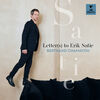Letter(s) to Erik Satie
Bertrand Chamayou
Classical - Released September 1, 2023 | Warner Classics
Top Boy (Score from the Original Series)
Brian Eno
Film Soundtracks - Released September 1, 2023 | Netflix Music
Janáček & Haas: String Quartets
Escher String Quartet
Chamber Music - Released May 19, 2023 | BIS
The two string quartets of Leoš Janáček are major works of the 20th century chamber repertory, with many strong recordings available. This one, however, stands out. The Escher String Quartet devises a unique program of three works that lie on the edge between program music and realms of individual psychology, and the music gains a cumulative effect as it proceeds. The album would be worth the listener's time and money just for the String Quartet No. 2, Op. 7, of Pavel Haas, who was killed by the Nazis in 1944. Subtitled "From the Monkey Mountains" (a name for the Moravian Highlands in Brno lingo), the work has programmatic titles, but Haas insisted that it was not to be taken as representational; rather, the movements were about the states of mind the region inspired. The main attraction is the finale, "A Wild Night," which adds percussionist Collin Currie. It is a riotous piece that incorporates rollicking syncopations. As the annotations point out, Janáček's String Quartet No. 1 ("The Kreutzer Sonata") is unique in the musical literature in being a composition based on a literary work (a novella by Tolstoy) that was itself based on another piece of music, the Violin Sonata No. 9 in A minor, Op. 47 ("Kreutzer") of Beethoven. Both the Janáček sonatas have lurking erotic content. Tolstoy's tale is a right-wing Christian work whose religious position is undermined by the author's sheer literary talent, while the String Quartet No. 2 ("Intimate Letters") was an extended love letter to the composer's young mistress. The entire program is absorbing, and the Escher String Quartet brings the proper intensity without losing accuracy. Ideally, intimate sound from Potton Hall in Suffolk complements all the ideas here in one of the strongest chamber recordings of 2023.© James Manheim /TiVo
Facing You
Keith Jarrett
Jazz - Released March 1, 1972 | ECM
Memoryhouse
Max Richter
Miscellaneous - Released May 27, 2002 | Studio Richter
Construction Time Again (Deluxe)
Depeche Mode
Rock - Released August 22, 1983 | Columbia
Landscape a Go-Go (The Story of Landscape 1977-83)
Landscape
Electronic - Released July 21, 2023 | Cooking Vinyl Limited
Home
Søren Bebe Trio
Jazz - Released November 1, 2016 | From Out Here Music
Morton Feldman : Rothko Chapel (+ Satie & Cage)
Kim Kashkashian
Classical - Released October 2, 2015 | ECM New Series
The Wonderful World Of Antonio Carlos Jobim
Antonio Carlos Jobim
Pop - Released February 5, 2008 | Rhino - Warner Records
Storm Damage
Ben Watt
Alternative & Indie - Released January 31, 2020 | Unmade Road
Janáček & Haas: String Quartets
Colin Currie, Pavel Haas Quartet
Chamber Music - Released April 11, 2006 | Supraphon a.s.
The Landscape of the Polyphonists
Huelgas Ensemble
Classical - Released March 25, 2022 | deutsche harmonia mundi
Keeper of the Shepherd
Hannah Frances
Folk/Americana - Released March 1, 2024 | Ruination Record Co.
The Art Of Change
Droeloe
Alternative & Indie - Released September 15, 2023 | DROELOE
Coleridge-Taylor
Chineke! Orchestra
Classical - Released September 30, 2022 | Decca Music Group Ltd.






















 Suppose you have a more precise idea of what you want. If you are searching for the album "Bad" by Michael Jackson, type michael jackson bad. The album in question will be displayed at the top, as it is the most relevant.
Suppose you have a more precise idea of what you want. If you are searching for the album "Bad" by Michael Jackson, type michael jackson bad. The album in question will be displayed at the top, as it is the most relevant.
 By default, search results are sorted in order of relevance. The drop-down menu to the right of "Sort by" allows you to display the results in the desired order.
By default, search results are sorted in order of relevance. The drop-down menu to the right of "Sort by" allows you to display the results in the desired order.